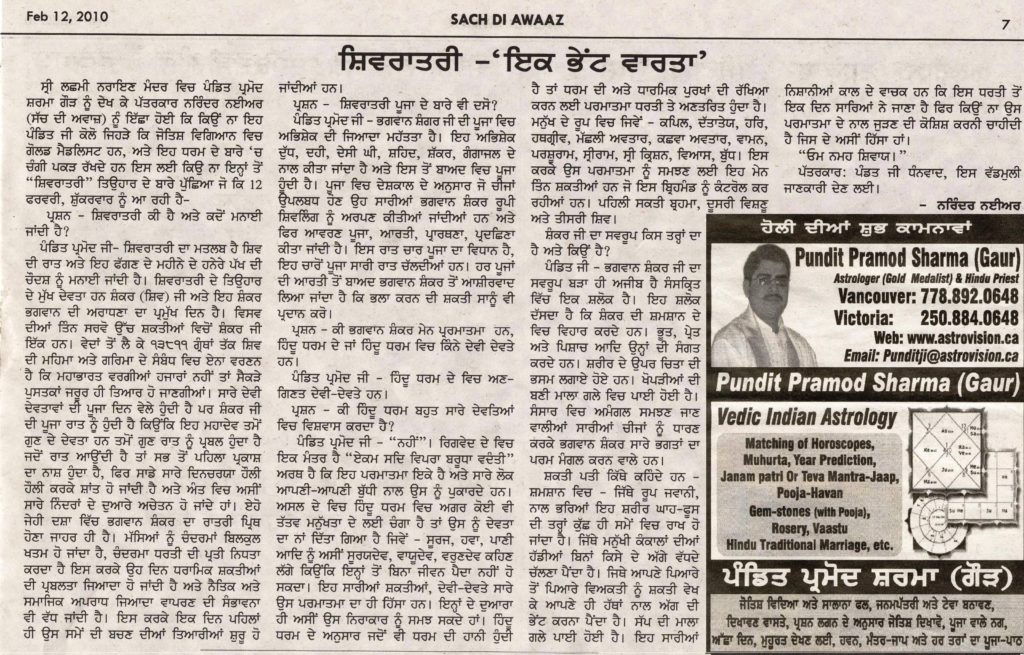Holi (ਹੋਲੀ)
A Precious Parable From The Upanishads
Dr. Sethu Raju and Pundit Pramod Sharma (Gaur)
Long ago the Hindu sages arduously prayed to gods to know more about their own existence as humans and the uniqueness of the universe. Often, they were also possibly deeply indulged in discussions of religion and philosophy, including some enigmatic problems, such as the origin of universe and the origin of life. Although they did not arrive at any definite conclusions, the highly knowledgeable rishis did, however, leave a legacy of many written parables, in the form of lyrics and dialogues, Continue reading “A Precious Parable From The Upanishads”
God And Human Suffering
(The Hindu perspective Researched and compiled by: Dr. Suresh Basrur )
In order to address this question, “How to reconcile the existence of God and human suffering?” we must first get an understanding of the relationship between God and human being. Hindu scriptures tell us that every human being has a soul (atman), which is in fact a part of the Supreme Being (Brahman). The goal of the human soul atman is to ultimately become one with the Supreme Being (Brahman). Continue reading “God And Human Suffering”
The Hindu Doctrine of Karma – in brief
(Dr. Sethu Raju and Pundit Pramod Sharma)
Aeons ago, the wise sages stood on the riverbanks of ancient India and sang their exalting devotional songs that were as if “by the breath of God”. Out of these chants and out of the profound wisdom and spirituality of the sages in the centuries has since grown the Sanatana Dharma or Hinduism, the religion of the Hindus. It contains solid and uncorrupted principles (shrutis and smritis), which may be called the doctrines, to appeal to the vast masses of the followers of this ancient religious faith or the way of life in the world. One of the eternal smritis is the doctrine of Karma. Continue reading “The Hindu Doctrine of Karma – in brief”
Hinduism and Environment
How Religion can Protect the Environment (Dr. Suresh Basrur)
1. Hindu teachings on nature and the environment
From the earliest days of the Hindu civilization, reverence for the environment has been an integral part of Hindu society. Our ancient forefathers perceived God’s presence around them through nature; they considered the natural forces which affected their lives as manifestations of the Supreme Being or God named Brahman. Continue reading “Hinduism and Environment”
The Hindus-in Pursuit Of Peace
Sachendra Nigam and Sethu Raju
The sound of one of the most frequently uttered chants that reverberates in all Hindu temples is – Om Shantih, Om Shantih, Om Shantih” (Aum Peace, Aum Peace, Aum Peace). This ritual of prayer for peace is very characteristically repeated thrice – chanting aloud first, addressing to the powerful forces, such as Earthquakes, Tsunamis, Volcanoes, Meteorites, and other natural phenomena that are beyond human control, second time addressing the same softer to the people and all life immediately around and out in the world, and finally addressing almost silently to oneself, to aatma or soul. This pattern of praying is significant Continue reading “The Hindus-in Pursuit Of Peace”
Hindu Rituals and Routines
Hinduism is not a religion but a way of life. Unlike other religions, Hindu dharma has many specialties. This is not known as a religion, it is known as the dharma; Sanaathana Dharma. Sanaathana means, according to Bhagavath Geetha, which cannot be destroyed by fire, weapons, water, air, and which is present in all living and non living being. Dharma means, the way of life which is the ‘total of all aachaaraas or customs and rituals’.
Is Religion Dead?
A Hindu Perspective by Dr. Suresh Basrur
The question “Is religion dead?” can be rephrased from the Hindu perspective as the question “Is Hinduism dead?” The short answer is, “No. Hinduism is not dead. In fact it is thriving and growing.” Before we examine the current state of Hinduism worldwide, let us first look at the cycles which Hinduism has undergone over the past thousands of years.
1. Hinduism’s cycles of resurgence and suppression:
Hinduism has undergone a number of cycles of resurgence Continue reading “Is Religion Dead?”
Good to Know
Hindu Scriptures
Nine kinds of Devotions: 1. to Listen, 2. Sing, 3. Worship, 4. Bowing down, 5. Serving, 6. Thinking, 7. Dedication, 8. Humility, 9. Intimacy.
Nine Kinds of Ego: 1. Possession, 2. Wealth, 3. Singing hymns, 4. Knowledge, 5. Education, 6. Beauty, 7. Youth, 8. Family lineage, 9. Cast or sect
Five Koshas or Coverings:
- Annamaya, (Gross physicals body made of and sustained by food),
- Pranamaya (vital covering consisting of five Praanaas or vital force),
- Manomaya (mental cover),
- Vigyaanmaya (cover of intelligence),
- Anandamaya (cover of bliss).
Five Enemies: 1. Lust, 2. Anger, 3. Greed Continue reading “Good to Know”


